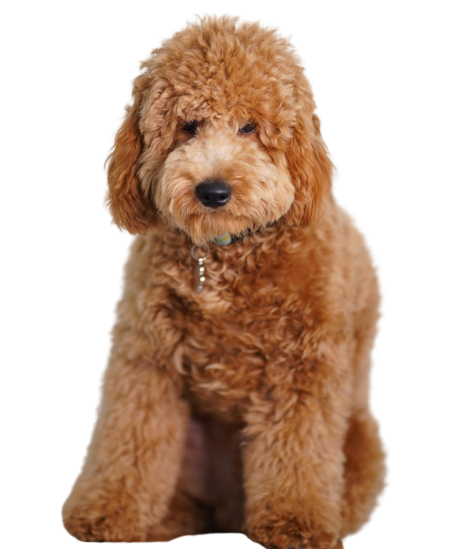The Mini Goldendoodle has skyrocketed in popularity over the years. Their endearing nature, combined with their hypoallergenic coat and friendly demeanor, makes them a top choice for many families.
This guide is here to equip you with all the essential information you need about this breed. From understanding the different generations to picking the right puppy and ensuring its well-being, we’ve got you covered.
Key Takeaways:
- Understand Goldendoodle Generations: Familiarize yourself with terms like F1, F1B, and F1BB. Each has distinct coat types and temperaments.
- Choosing the Perfect Puppy:
- Gender Considerations: Males and females can differ in behavior. Choose based on your household’s dynamics.
- From the Litter: Observing litter behavior can hint at a puppy’s temperament. Look for balanced personalities.
- Spot Red Flags: Beware of overly aggressive or extremely timid pups. Health issues are also critical to note.
- Choosing a Reputable Breeder: Ensure they prioritize the well-being of their dogs. Ask questions about health screenings and lineage.
- Embrace the Responsibility: Bringing a Goldendoodle home means embracing a decade-long commitment filled with love, challenges, and joy.
Goldendoodle Generations Explained:
When you delve into the world of Goldendoodles, you’ll often come across terms like F1, F1B, and F1BB. These denote different generations of Goldendoodles.
- F1 Goldendoodles: These are the first generation, a direct cross between a Golden Retriever and a Poodle. They typically possess a wavy or slightly curly coat. Being 50% of each breed, they represent a genuine blend of both parent breeds in behavior and appearance.
- F1B Goldendoodles: This generation is 75% Poodle, which means they’re usually more hypoallergenic, making them a great choice for allergy sufferers. Their coat is often curlier, resembling the poodle more closely.
- F1BB Goldendoodles: The most Poodle-like of the bunch, these Goldendoodles are 87.5% Poodle. They inherit most of the Poodle’s qualities, especially the hypoallergenic trait and the curly coat.
Each generation has its unique set of characteristics. If allergies are a significant concern, you might lean towards F1B or F1BB. If you’re looking for a balanced mix of both breeds, an F1 could be perfect.

Choosing the Right Puppy for Your Household:
Gender Preferences:
Male Mini Goldendoodles:
- Temperament: Males, in general, are often more playful, assertive, and active. They tend to be more attention-seeking, and their affectionate nature can make them slightly more dependent on their owners.
- Size: Male Goldendoodles can be slightly larger than their female counterparts.
- Training: Males can sometimes be more stubborn during training sessions, but with consistent positive reinforcement, they pick up commands effectively.
- Social Dynamics: They might be more dominant when interacting with other dogs, especially if not neutered.
Female Mini Goldendoodles:
- Temperament: Females can be more independent and might be a bit more reserved or shy initially. However, once they bond, they exhibit a deep loyalty to their families.
- Size: Females tend to be slightly smaller and might reach maturity faster than males.
- Training: They can be more focused and might pick up training cues quicker, but they also have their moments of stubbornness.
- Social Dynamics: Females can be territorial, especially around their living space. Early socialization can help in making them more amiable.
Selecting from a Litter:
Choosing a pup from a litter is a significant decision. Here are some tips to guide you:
- Engagement: A well-balanced puppy will be curious and willing to engage with you without being overly aggressive or too timid.
- Physical Examination: Check the puppy’s body. A healthy puppy should have clear eyes, clean ears, and a moist nose without any discharge.
- Activity Level: While it’s adorable to pick the puppy that runs up to you first, it’s also essential to observe their behavior with their siblings. A good sign is if they play well with others without being a bully or overly submissive.
- Response to Sounds: Clap your hands or make a sound. A puppy that’s curious and turns towards the noise is usually confident. If they cower, they might be more on the timid side.
- Feeding Behavior: Watching the puppies eat can give insights into their behavior. Puppies that push others out of the way might be more dominant, while those hanging back could be more submissive.
Red Flags:
When picking your Mini Goldendoodle, it’s essential to watch out for potential red flags that might indicate health or behavioral issues:
- Lethargy: A puppy that’s often isolated from its siblings or isn’t active could be a sign of health issues.
- Physical Anomalies: Check for any limping, patches of missing fur, or signs of external parasites like fleas and ticks.
- Behavioral Concerns: Over-aggressiveness or extreme timidity can indicate behavioral issues that might become challenging as the puppy grows.
- Runny Nose or Eyes: Any discharge from the nose or eyes can be an early sign of infections or other health issues.
- Lack of Appetite: While it’s normal for puppies to have varying appetites, a puppy that consistently avoids food might have health problems.
Preparing Your Home and Knowing What to Expect:
Bringing Home Your New Puppy:
Imagine this: You’re bringing home a new baby, but this one’s furry and walks on all fours. Just like a human baby, puppies need a safe and welcoming environment.
- Safe Spaces: Picture yourself in a brand-new place. Kinda scary, right? That’s how your puppy feels. So, create a little corner for them. Add a soft bed, a couple of chew toys, and a bowl of water. This spot will be their go-to place when they need a break.
- Puppy-Proofing: Puppies are curious little beings. They’ll chew, scratch, and explore every corner. So, keep away the things you don’t want to be destroyed. Secure your trash, hide wires, and put away those designer shoes!
Goldendoodle Sleeping Habits:
Where should a Goldendoodle sleep? It’s a question many new owners ask. In the beginning, it’s good to have a designated sleeping area. This could be a comfy crate or a plush dog bed in a quiet corner. Over time, some owners let their pups hop onto the bed. Consistency is key. Whatever you decide, stick to it. Also, puppies sleep a lot! Just like babies, they need this sleep to grow and stay healthy. So, let your little one snooze without disturbance.
Making Your Goldendoodle Happy:
Goldendoodles, with their boundless energy, love to play. Here’s how you can keep that tail wagging:
- Puppy Playtime: Got a garden? Play fetch. No garden? No worries. Indoor fetch works too. Just clear some space.
- Exploration Walks: Puppies are curious. A walk isn’t just exercise. It’s a chance to explore. So, let them sniff around.
- Training Sessions: Yes, it’s about discipline. But for a pup, it’s also playtime with you. Plus, it tires them out (bonus!).
- Interactive Toys: Can’t play all the time? Get toys that challenge them. Think toys they can chew or toys that dispense treats.
Understanding the Unique Characteristics of Goldendoodles:
Hypoallergenic Nature:
Sneezing every time you pet a dog? Goldendoodles might be your answer. Thanks to their Poodle parent, they’re often suitable for allergy sufferers. But, keep in mind, that grooming is crucial. It keeps those sneezes away.
Developmental Milestones:
Are you eager to know when your pup will mellow out? While playful, Mini Goldendoodles usually become calmer by ages 2-3. But hey, every dog’s unique. Some remain playful furballs forever!
Potential Disadvantages:
Let’s be real. No breed’s perfect. Goldendoodles can sometimes be a handful. They can be stubborn, and if they’re bored, watch out for chewed shoes or dug-up gardens.

Grooming and Care for Your Puppy:
Puppy Grooming Needs:
That soft puppy fur? It needs care. Regular brushing will keep it shiny and tangle-free. As your pup grows, you’ll notice its coat changing. It could become curly or wavy. This change means more grooming. Booking a puppy’s first groomer visit? Make sure the groomer has experience with Goldendoodles.
Puppy Health Check-Ups:
Starting on the right foot, or paw is crucial. Schedule a vet visit soon after bringing your puppy home. Regular check-ups will help spot and prevent issues early on. Watch out for common concerns like hip dysplasia. A balanced diet and routine care can keep your pup at its healthiest.
Petting and Bonding:
Goldendoodles love affection. Gentle strokes on their back or playful belly rubs will make them your best friend in no time. But always approach a puppy calmly, especially if they’re asleep or eating. Give them their space, and they’ll come to you when they’re ready.
Ensuring You’re Working with a Reputable Breeder:
Finding the right puppy means finding the right breeder first. Here’s what you should know:
The Dangers of Puppy Mills:
Ever heard of the term ‘puppy mill’? It’s as bad as it sounds. These are breeding facilities where profit is prioritized over the well-being of the dogs. Puppies from such places often have health and behavioral issues. They might seem cheaper initially, but in the long run, the vet bills and heartaches can pile up.
What Makes a Breeder Reputable?:
Good breeders love what they breed. It’s that simple. Here’s how you can identify one:
- Openness: They’ll willingly answer your questions, show you around their facility, and introduce you to the puppy’s parents.
- Health Checks: They’ll provide health clearances for both puppy parents, ensuring common genetic conditions, like hip dysplasia, are less likely.
- Knowledge: They won’t just sell you a puppy. They’ll educate you about the breed, offering advice on care, grooming, and training.
- Commitment: A reputable breeder always thinks of the puppy’s welfare. They’d have a clause in the contract stating they’d take the pup back if things don’t work out.
Questions to Ask Your Breeder: Ensuring a Healthy and Happy Puppy
Before you commit to bringing a new Mini Goldendoodle puppy into your home, it’s essential to ensure you’re making the right choice for both you and the pup. One of the best ways to do this is by asking your breeder some key questions. This not only helps you gauge the breeder’s knowledge and responsibility but also ensures you’re getting a healthy and well-adjusted puppy.
- Health Screenings: “What health screenings have the puppies undergone?” This question ensures that common genetic issues, like hip dysplasia, have been checked and addressed.
- Lineage Details: “Can you provide information about the puppy’s parents?” Understanding the temperament, health, and size of the parent dogs can give you insights into how your puppy might grow.
- Socialization: “How have you socialized the puppies?” Puppies should be introduced to various people, sounds, and other animals to ensure they grow to be well-adjusted adults.
- Diet and Feeding: “What diet have the puppies been on?” Knowing what the puppies have been eating can help you continue with a similar diet or transition them to a new one smoothly.
- Adoption Assurance: “What is your policy if there are unexpected challenges or circumstances?” It’s essential to understand the breeder’s approach to ensuring the well-being of the puppy, even if unforeseen situations arise.
- Vaccination and Medical Records: “Can you provide a record of the puppy’s vaccinations and any medical treatments?” This ensures you’re up-to-date with the puppy’s health requirements.
- Recommendations: “Do you have references or reviews from previous buyers?” Hearing from other families who’ve adopted from the breeder can provide peace of mind.
- Aftercare: “What support do you offer after the puppy comes home?” Some breeders offer guidance on training, health issues, or other concerns even after you’ve brought the puppy home.
Final Thoughts
Bringing a Mini Goldendoodle into your life is a journey filled with fluffy cuddles, playful afternoons, and a few chewed shoes. But every moment is worth it. Whether it’s the way their tail wags, their excited barks when you return home, or their cuddles on a cold night, the joy a Goldendoodle brings is unparalleled.
Owning a dog, especially a breed as wonderful as the Goldendoodle, is a commitment. It’s about understanding them, catering to their needs, and loving them unconditionally.
In return, you get a loyal companion, a guardian, and a fluffy friend who thinks the world of you. So, as you embark on this journey, remember that while the start might be about finding the perfect puppy, the end is about cherishing the perfect bond.

